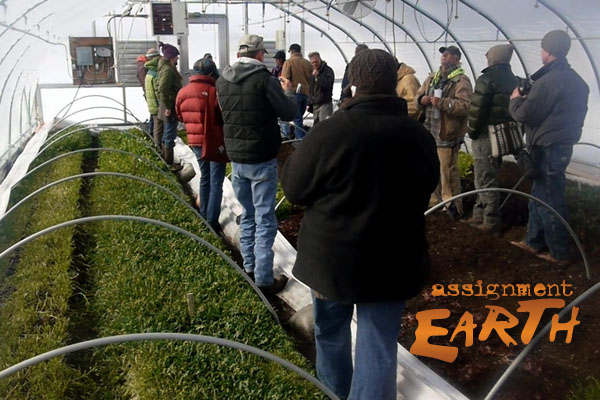23 Mar Assignment Earth: Sustainable Winter Agriculture – The Joy Trip Project

Making the growing season grow longer, that’s the idea for Daphne Yannakakis, an organic farmer in western Colorado. Along with husband Don Lareau on Zephyros Farm, they’re growing vegetables in wintertime as part of a study by Colorado State University. The vegetables grow under the protection of unheated green houses called high tunnels, which hold in heat stored by the Earth at night and capture solar heat during the day. They also provide protection from the wind. These farmers plant a variety of cold hardy vegetables at monthly intervals and record weather data electronically with custom software.
The data is collected from five farms across Colorado and will be compiled and made available to other small-scale farmers. Funded by the U.S. Department of Agriculture and called the Sustainable Agriculture Research and Education program or SARE, the study is intended to help small-scale farmers in the Rocky Mountains remain productive and profitable through much of the winter by utilizing high tunnels. Even when outside temperatures reach sub-zero extremes these simple structures allow vegetables to survive harsh winter conditions and enable farmers to grow more.
“High Tunnels are cold frames. They’re very low-tech greenhouses without any supplemental heating or cooling in them,” said Frank Stonaker of Colorado State University. “They allow growers to extend their growing season at least a month on each end of the frost-free period.”
By enabling profitable small-scale organic agriculture Stonaker hopes to help reverse an alarming trend in American Farming.
“We have less than a percent of our population now that’s directly involved in food production,” he said. “That’s really susceptible to collapse.
Stonaker believes there is a crucial need for more young farmers in agriculture, especially those producing food locally on a smaller scale.
“A big part of sustainability is community sustainability and food security in the community,” he said. “The more local food that’s produced and the more people that are consuming locally produced food the better.”
[youtube]wy5veyCQDBY[/youtube]
Assignment Earth is a production of the nonprofit Environment News Trust



You must be logged in to post a comment.